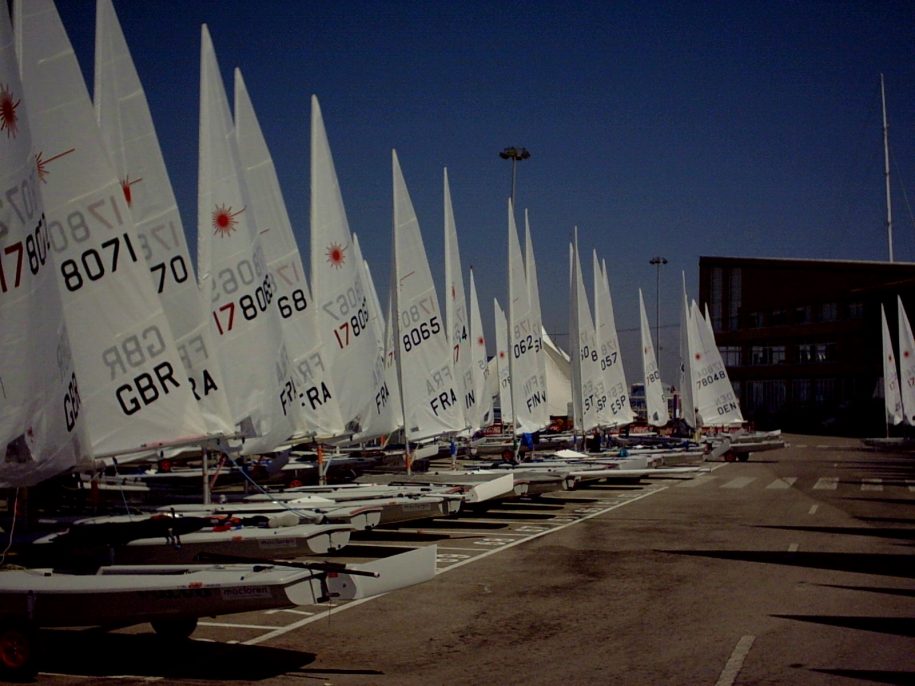Getting Ready Part II
SAILING FIT
By: Meka Taulbee
ACE Certified Personal Trainer
SAILFIT Inc
Getting Ready part 2
As a follow up to my last article I have asked about ten different sailors what they do to prepare for a regatta. I asked juniors to masters and novice to experienced. Needless to say I only got a few replies back. I take this as a good sign that everyone is just too busy sailing instead of sitting in front of their computers. Interestingly enough the responses I got were all from top level sailors on the current US and Canadian Sailing Teams.
Before I get into what they all said I want to thank each of them for taking the time to help me out. These sailors are some of the busiest I know so I really appreciate the thought and time they took answer these questions. I think it will give all of you some great insight into what it takes to put together a solid program. Thank you Andrew Campbell, Mike Leigh, Ian Lineberger, Kurt Taulbee and Anna Tunnicliffe.
I was hard to try to group the information because everyone is different and had varied responses. I decided to just out line the questions and give you what each person gave to me. As you read these think about what your own answers to these questions are.
- Do you do anything specific to prepare for a regatta?
Andrew– Plenty of details come into play for the preparation for a regatta. But, I think success is in the details. Getting housing figured out more than the afternoon you arrive!, making sure that all the parts and pieces are in place and working order before the first day of the regatta, and having spent a ton of time training in the weeks leading into the regatta, not just the afternoon ahead of time are three easy steps
Mike– Train on and off the water
Kurt-I work on my fitness so I go into a regatta feeling good in the boat. I work on my boat handling and balance in the boat a for a few sessions before the
regatta.
Anna– I practice a lot in my boat…either at the location, or at home depending on the level of the regatta. I also fuel my body up with energy to be prepared for whatever conditions may bring.
- How far in advance in advance do you start preparing?
Andrew– Fitness: months ahead, Housing/Flights: week(s) ahead, Proper food intake: days ahead, polish/soap boat: the day ahead, proper breakfast/bars/hydration: hours ahead…
Mike-11 months-The first month is mostly land training to get my fitness up to a reasonable level before I start working hard on the water.
Kurt-For a big event 3 months.
Anna– It depends…for worlds, I stat preparing right after the previous worlds, other regattas, I start preparing two days before…just depends again on the level of the competition
- How many hours do you spend in your boat on average?
Andrew-2-4 hours a day 4-6 days a week
Mike– Approx. 15hours/week
Kurt– 4 hours a week until 3 weeks prior to the regatta then 8 hours a week
Anna– Per week about 15
4) When you practice do you have specific things you want to work on each time?
Andrew– Specific things are in the works every time. Having a focused understanding of things that you want to improve is the key to getting anything out of practice. If it’s as simple as having better windward mark roundings, or better tacks, each practice must have a certain focus so that there are specific gains made in each session.
Mike– Yes, I always try to be focusing on one or two things when out training, or racing in a training event.
Kurt– Yes, very specific boat handling or speed drills
Anna– Yes…I set out a practice and focus on the little things for that day’s sailing
- Do you like to train with a partner/group/coach or would you rather train alone?
Andrew– As much as possible train with at least one other person. Not to say that it isn’t possible to get something out of sailing by yourself. Sailing with a coach is the biggest luxury in the sport. Take the maximum advantage of those situations by getting marks, drills, and film prepared before the practice session.
Mike–Training with a group of 3-5 quality sailors is ideal. Having a coach present is always an asset
Kurt– I like to train a small amount alone and then with a group with any number of sailors for the majority of the practice time. This works best for me, but not always possible.
Anna– Most of the time when I’m at home I train with my fiancé Brad, but when I’m else where, I train with other Radial sailors.
- What do you do physically to prepare?
Andrew– Weeks before the event strength training can still be in full force. I taper to only cycling in the week before the regatta.
Mike– I am in the gym 3 days a week lifting weights, and then 1-2 days a week of cardio.
Kurt– base aerobic fitness for several months then leading up to a competition I do plyometric work and hiking bench work( on the Quadzilla of course) and high heart rate cardio then balance and flexibility work.
Anna–I go to the gym 4-5 days a week to lift weights and I run between 20-30 miles a week
- Do you work on your fitness goals regularly or just before the regatta?
Andrew– I like to think that I work on them regularly, as much as possible.
Mike– Ideally, I start working on my fitness about 10-11 months before the major regatta of the year. It just depends on how much lead up time I have before that event.
Kurt– Regularly
Anna– regularly
- How about Nutrition? Do you work on this regularly or just before the regatta?
Andrew– Maintaining weight is the critical part of proper understanding of Laser sailing. Finding a healthy weight through proper nutrition should be a priority months ahead of a regatta that you are peaking for. That way you need not go through a crash diet or quick weight gain just before the regatta
Mike– I try to consume as much fruit and vegetables as I can. I find I get sick when I am not eating enough veggies.
Kurt– Generally, I eat pretty healthy all the time but during a regatta I have specific food and drinks that I use that are double, triple top secret!
Anna– All the time…you should have a healthy lifestyle whether you’re competing or not
- Do you do anything to Mentally Prepare?
Andrew– Mental preparation is focused in the details. The more details you’re sure you’ve already taken care of, the more at ease your mind will be. The more confident you are in every breeze condition, every sea-state, every current situation, every cross, duck, tack or jibe, the more at ease your mental state will be.
Mike– I work with the Canadian Team psychologist
Kurt– I think about and visualize the things I need to improve on to get the results I want. For example, my agility in the boat and maintaining a great attitude for the entire event.
Anna– Visualization…very important for when you can’t get on the water one day, or you haven’t raced in a while.
- Do you like to keep your training program secret or do you share with anyone who asks?
Andrew– Good sailors have some little secrets that they keep, but not many. The reason good sailors are good is because they don’t sit around and talk about their programs, they are constantly in the cycle of those training programs.
Kurt– I share mostly everything. I don’t have many secrets.
Anna– Share…if they can hang…then good on them…hehe…if I give help to someone, it’ll come around back when I need help with something.
Ian Lineberger summed up what he does pretty well by giving an example of how he trained for one regatta in particular. He says:
When I was training for the Masters in Ireland I sailed 9 major regattas in the 12 months leading up to the event. I remember practicing a few months before where I wasn’t able to get my legs tired after a 40 minute beat. That was a breakthrough for me, as I don’t really hike so well all the way around the course! I then took 30 days off right before flying over to heal and get my weight up to 190. No sailing, no running, no hiking bench, just sat on my butt. I really needed the extra weight as the food in Ireland was, well, hmm, that’s why the beer taste so good I guess.
Nothing beats big regatta time, if you have to practice alone sail long beats and runs while working on straight legging upwind and S carving downwind. Get a training partner, I sailed with Tim Landt the whole year prior to the 2001 Master Worlds and it helped us both. I would be very careful not to overdo it. You can hurt your back, especially on a hiking bench. Been there, done that, don’t like it! If you can’t sail to train then I prefer swimming and biking to get in shape. But the reality is you need the T.I.T.B. (time in the boat).
After training for that regatta which was the biggest master worlds ever (330 boats) I finished second in the 94 boat masters fleet.
Look at what these sailors have to say and compare your answers. They have all given you something to strive for if you are looking to improve your laser sailing. To learn more about what they are doing you can visit their websites.
Andrew– Member of the 2007 US Sailing Team www.campbellsailing.com
Mike– Member of the 2007 Canadian Sailing Team http://www.sailing.org/bio.asp?ID=CANML1
Kurt –Member of the 2007 US Sailing Team, Apprentice Master www.sailfit.com
Anna– Member of the 2007 US Sailing Team www.annatunnicliffe.com
Ian– Past president of the International Laser Class for 5 years and North American Laser class president for 10 years. Coach of Team4
Give these sailors some support they are all working hard to achieve their goals and dreams. They should be an inspiration to everyone.




